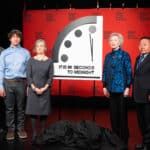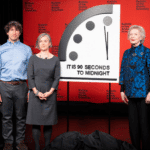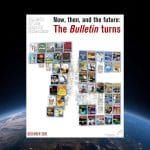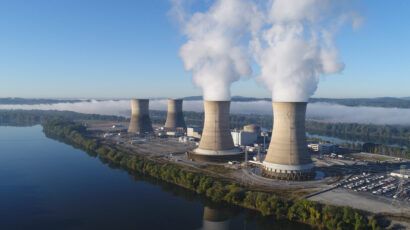If you abhor chemical attacks, support a ban on nuclear weapons
By Tim Wright | April 25, 2017
Early this month, the world recoiled in horror as evidence emerged of another chemical attack in Syria. Images of injured civilians, including young children, filled the news media, and heads of state and government swiftly condemned the assault, which claimed scores of lives. World leaders declared, in no uncertain terms, that the use of chemical weapons is unacceptable—and a violation of international law. Many vowed to work to bring the perpetrators of this heinous crime to justice.
Canadian Prime Minister Justin Trudeau said that his nation “condemns all uses of chemical weapons.” He labelled the attack a “gruesome” war crime. His Australian counterpart, Malcolm Turnbull, was equally resolute: “The use of chemical weapons is illegal and abhorrent.” German Chancellor Angela Merkel described the attack as “barbaric.” And US President Donald Trump said, “no child of God should suffer such horror.” He was so appalled by the chemical weapons attack that he escalated US military involvement in Syria with an attack on a government airbase.
Yet these same leaders insist that under certain circumstances, the use of nuclear weapons—devices of vastly greater destructive potential—can be justified. In international forums, their envoys have argued that such weapons are legitimate despite the catastrophic human harm they inflict. They have claimed that nuclear weapons are tools for maintaining world peace or “geostrategic stability,” and that certain nations may rightfully possess them. It is on this basis that countries like Britain, France, South Korea, Germany, and the United States are boycotting the UN negotiations that began in March on a nuclear weapon prohibition treaty.
However, the vast majority of UN member states do not see these weapons as tools of peace and stability. Rather, they see them as an intolerable threat to our very survival. For this reason, more than 130 governments are working determinedly to eliminate them. Declaring them illegal is the necessary starting point. Over time, the prohibition treaty will establish a powerful norm against their possession by any state, as already exists for chemical and biological weapons.
In a 2014 lecture, Angela Kane, then the top UN disarmament official, commented on the strong stigma against those two prohibited classes of weapons of mass destruction. “How many states today boast that they are ‘biological-weapon states’ or ‘chemical-weapon states’?” she asked. “Who is arguing now that bubonic plague or polio are legitimate to use as weapons under any circumstance, whether in an attack or in retaliation? Who speaks of a bio-weapon umbrella?”
While the existing Nuclear Non-Proliferation Treaty (NPT) has helped curtail the spread of nuclear weapons, it has failed to properly stigmatize them. The five nations defined as “nuclear-weapon states” under the treaty consider their designation a mark of prestige, not dishonor. And more than two dozen states party to the NPT show no shame in claiming protection from an ally’s nuclear forces. What these so-called umbrella states are contemplating is the widespread slaughter of civilians on their behalf.
In time, nuclear-armed countries and the allies they “protect” will surely come to realize their great folly. They will act responsibly and join the international mainstream in rejecting nuclear weapons categorically. They will move from being part of the problem to part of the solution. Any leader who abhors the use of chemical weapons, and cannot tolerate the sight of injured and dying children, must recognize that nuclear weapons are an even greater menace requiring nothing less than our full-throated opposition.
This post is part of Ban Brief, a series of updates on the historic 2017 negotiations to create a treaty banning nuclear weapons. Ban Brief is written by Tim Wright, Asia-Pacific director of the International Campaign to Abolish Nuclear Weapons, and Ray Acheson, director of Reaching Critical Will.
Together, we make the world safer.
The Bulletin elevates expert voices above the noise. But as an independent nonprofit organization, our operations depend on the support of readers like you. Help us continue to deliver quality journalism that holds leaders accountable. Your support of our work at any level is important. In return, we promise our coverage will be understandable, influential, vigilant, solution-oriented, and fair-minded. Together we can make a difference.
Topics: Announcement














